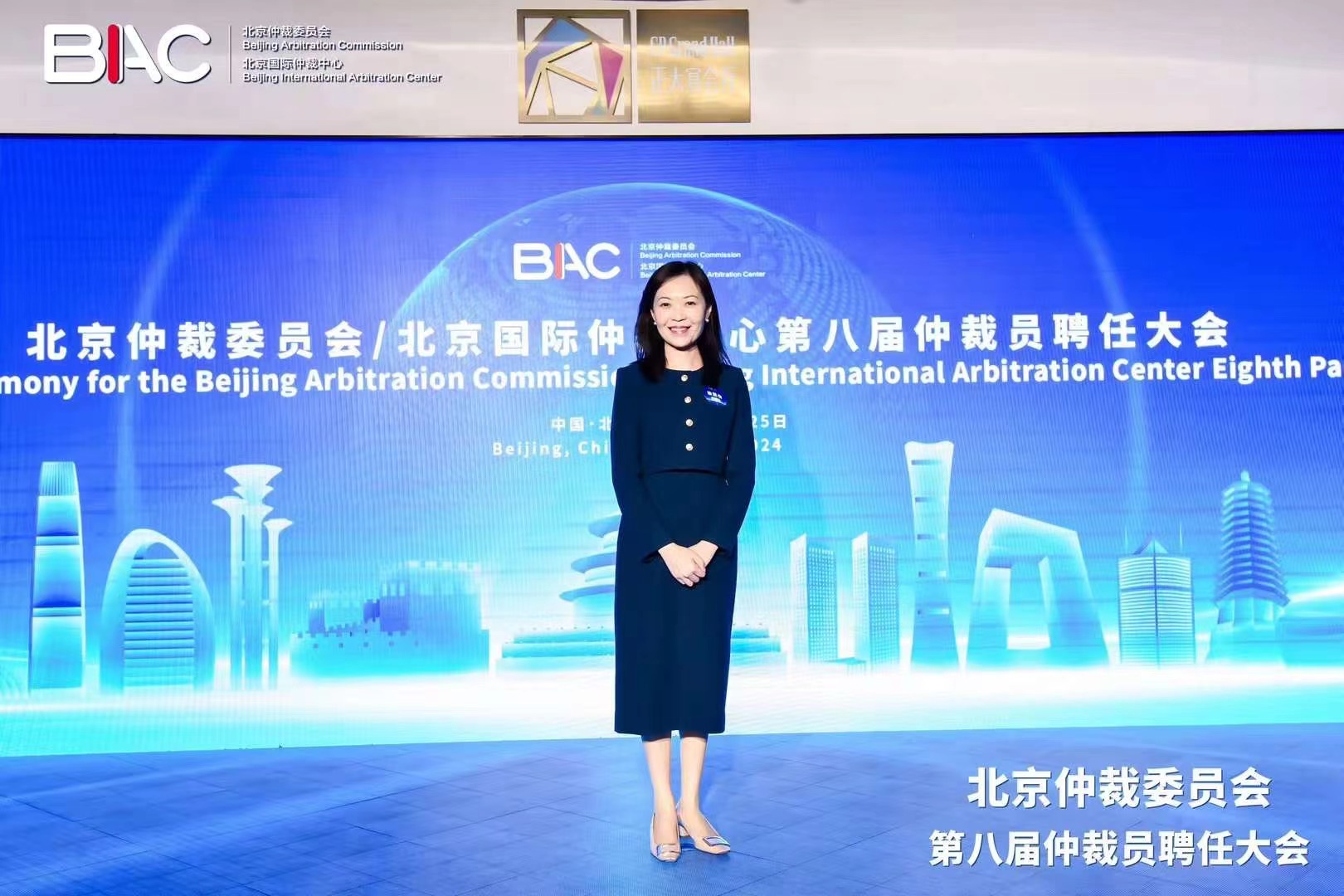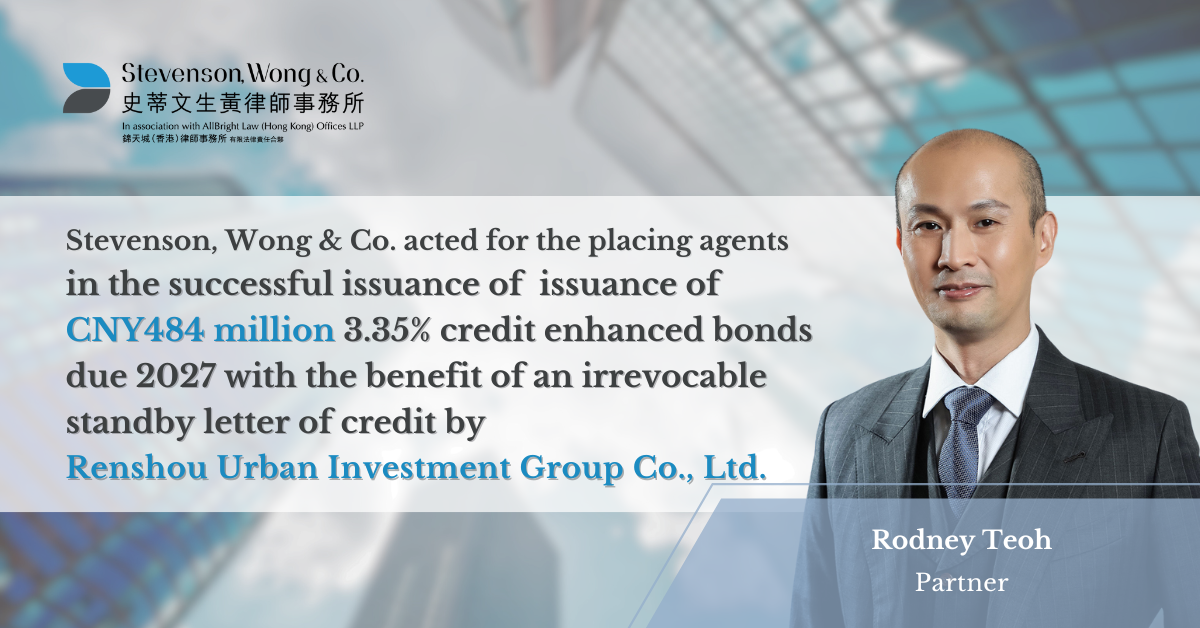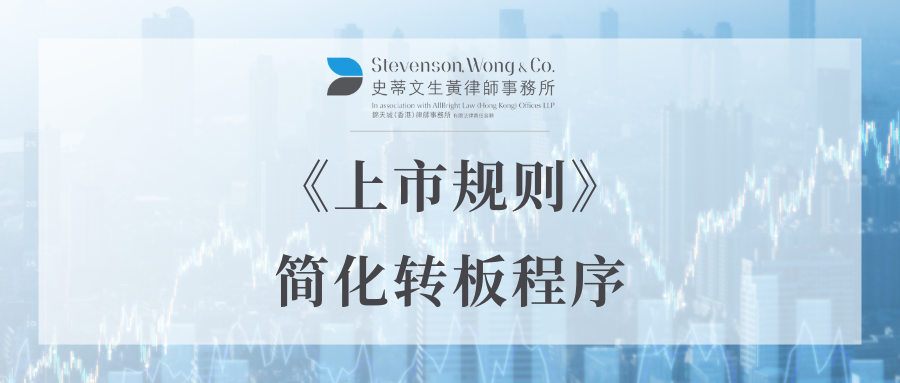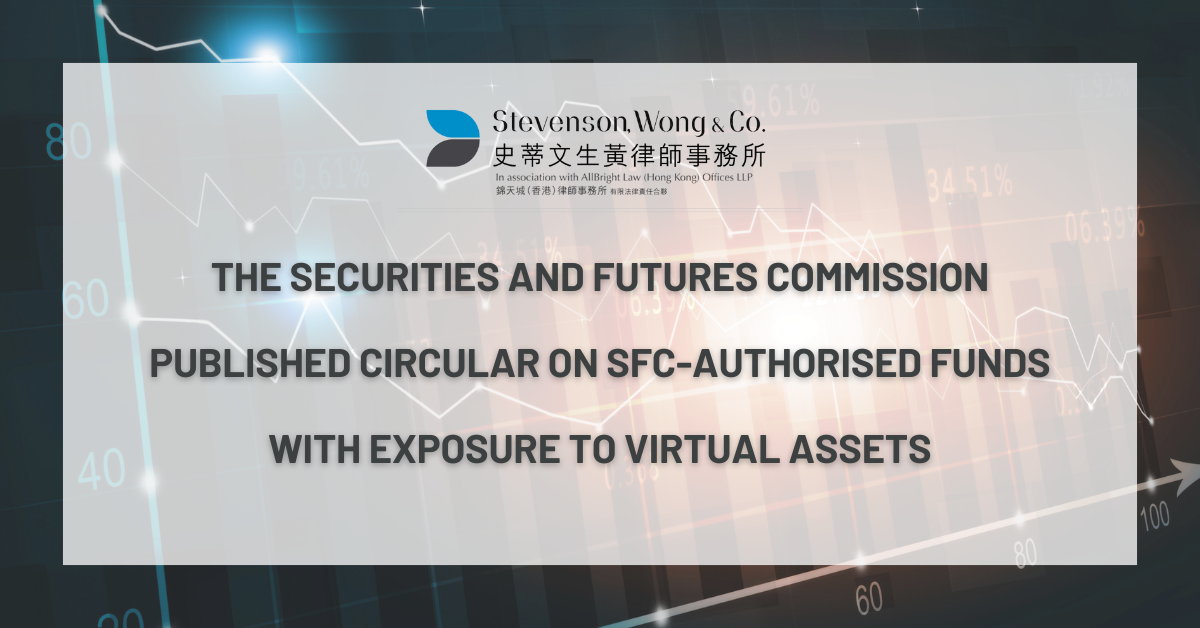News Updates
Find out all about our firm’s latest news updates below. To learn more about any individual item, please contact us here.
News Updates
Find out all about our firm’s latest news updates below. To learn more about any individual item, please contact us here.
Stevenson, Wong & Co. acted for Jiangyou Hongfei Investment (Group) Co., Ltd. in the successful listing and issuance of US$62,000,000 7.0% guaranteed Bonds due 2027 (the “Bonds). The Bonds were listed on Chongwa (Macao) Financial Asset Exchange Co., Limited (“MOX”) on 3 June 2024 (MOX Bond Code: MOXTB24119).

The Issuer is a state-owned enterprise 67% owned by Jiangyou Hongyuan Hechuang Industrial Development Group Co., Ltd. and 33% owned by Mianyang Miantai Industrial Co., Ltd. The Issuer is an asset operating entity in Jiangyou City and engages in the businesses of gas supply, water supply and public transportation. It also participates in the investment and construction of municipal infrastructure, road pipeline networks, resettlement housing and other projects.
Our team was led by Partner Rodney Teoh, supported by Associates Angela Lau and Audrey Ng, Trainee Solicitor Austin Kot, and Paralegal Jay Lee.
Please contact our Partner Rodney Teoh for any enquiries or further information.

本次大会邀请到了北京市司法局党委书记、局长崔杨,以及党委委员、副局长张国强出席。北仲主任郭卫,副主任王利明,连同北仲全体工作人员及600多位仲裁员一同参与了本次盛会。
此次聘任是北仲对徐凯怡律师在法律专业领域的深厚造诣及其专业能力的充分认可。徐律师表示,她将不负重托,在任期内将竭尽所能履行仲裁员职责,为经贸争议的解决以及推动北仲的长远发展贡献力量。





关于北京仲裁委员会/北京国际仲裁中心
北京仲裁委员会/北京国际仲裁中心于1995年9月28日设立,并在2018年成为首批纳入最高人民法院“一站式”国际商事纠纷多元化解决机制的五家仲裁机构之一。经成立二十余年来,北仲已成为国际性的多元争议解决中心。
第八届仲裁员选聘充分体现了北仲仲裁事业发展的实际需求和北京国际商事仲裁中心建设的发展目标,是北仲全面落实市委市政府《关于北京仲裁委员会体制机制改革总体方案》,提升仲裁公信力的重要举措。
Stevenson, Wong & Co. acted for the placing agents in the successful issuance of CNY484 million 3.35% credit enhanced bonds due 2027 with the benefit of an irrevocable standby letter of credit by Renshou Urban Investment Group Co., Ltd. (the “Issuer”).

The Issuer is a directly wholly-owned company of Renshou County State-owned Assets and Financial Work Bureau. The Issuer is an important investment and management entity of state-owned property and a main operation entity for production and sales of electronic products and wire and optical cable, transfer of own land, water affairs, agent construction service fees, and engineering product in Renshou.
Our team was led by Partner Mr. Rodney Teoh, supported by team members including Associates Ms. Angela Lau and Ms. Audrey Ng, Trainee Solicitor Mr. Austin Kot, and Paralegal Mr. Jay Lee.
Introduction
On 8 February 2024, the Financial Services and the Treasury Bureau (the “FSTB”) published a consultation paper (the “Consultation Paper”) inviting public feedback on its proposed legislative regulation of over-the-counter (“OTC”) trading of virtual assets (“VA”).

The proposed reforms aim to introduce a licensing regime for providers of VA OTC services under the Anti-Money Laundering and Counter-Terrorist Financing Ordinance (Cap. 615) (“AMLO”). The proposal can be divided into four main parts: (1) the scope and coverage of the regime; (2) the proposed regulations to be imposed on licensees; (3) the licence period and transitional arrangements; and (4) the powers of the licensing authority in regulating the regime.
Legislative Proposals
Scope and coverage of the regime
The FSTB notes that regulating the VA OTC industry requires regulating any person involved in the marketing and operation of said business in Hong Kong. They propose that such involved persons must obtain a licence issued by the Commissioner of Customs and Excise (the “CCE”) under their proposed licensing regime. They propose that a VA OTC business shall be defined as:
(a) by way of business, provision of service of spot trade of any VA;
(b) irrespective of whether the service is provided through a physical outlet (i.e. including ATMs) or other (e.g. digital) platforms; and
(c) explicitly excluding the operation of a virtual asset trading platform (“VATP”) as already covered under the VATP licensing regime.
The FSTB also notes that operators of VA trading services may also provide temporary custody/escrow service for their client’s VA as part of the transaction process. The FSTB welcomes public feedback on whether temporary custody/escrow service as part of the transaction process should be covered by the proposed regulatory regime, and whether there should be dedicated regulatory requirements for such temporary custody/escrow service.
With the intention for effective supervision and monitoring, the FSTB proposes that license applicants will be restricted to locally incorporated companies with a permanent place of business in Hong Kong, or companies incorporated elsewhere but registered in Hong Kong under the Companies Ordinance (Cap. 622). The CCE will also consider all relevant matters in deciding whether an applicant is fit and proper.
Noting the regulations already in place for licensed corporations, authorised institutions and licensed stablecoin issuers, the FSTB believes it appropriate for these entities to be exempt from the licensing regime should they provide VA OTC services.
Proposed regulations imposed on licensees under the regime
Under the regime, licensees are allowed to perform spot trade of VA for any money or vice versa in their course of business, but will only be allowed to perform remittance of exchange proceeds on specified conditions. To mitigate money laundering/terrorist financing (“ML/TF”) risks, licensees will only be allowed to transfer VA relevant to a transaction from their registered wallets to a client wallet owned or controlled by the client. Furthermore, VA-to-VA trading services are prohibited unless with a VATP licence. Licensees will also be required to observe the anti-money laundering/counter-terrorist financing (“AML/CTF”) requirements as set out in the AMLO when it comes to customer due diligence and record-keeping.
FSTB notes that the licensing regime will be limited to trading purposes only and other services, including any form of advisory, referral, or offering of VA derivates or other financial products will not be permitted under the licensing regime.
With the intention of having a more stringent standard of supervision to offer adequate investor protection, VA OTC licensees will not be permitted to offer services in respect of tokens that not accessible by retail investors on at least one SFC-licensed VATP or stablecoins not issued by issuers licensed by the Hong Kong Monetary Authority (“HKMA”).
FSTB also proposes that further safeguards be put in place due to the tech-savvy and highly speculative nature of VA. In particular, FSTB considers it appropriate for VA OTC licensees to be subject to a set of robust regulatory requirements to ensure that they have the capacity and know-how to operate the VA OTC business properly.
Further regulatory requirements also reference those enlisted in the VATP and money service operators (“MSOs”) regime. For further details relating to the scope of such requirements, please refer to paragraph 2.18 of the Consultation Paper.
As part of the CCE’s duty to regulate, licence will only be granted when all specified requirements are met. It would subsequently be prohibited for any person to actively market a regulated VA OTC service unless licensed by CCE to conduct such service. In case of non-compliance, VA OTC licensees will be subject to disciplinary and investigative proceedings and subsequent enforcement actions, as elaborated below.
Licence period and transitional arrangements regarding the regime
The FSTB proposes that under the licensing regime, a successful applicant will be granted a licence of two years, renewable for two years upon application and to the satisfaction of CCE. The FSTB also suggests a transition period of six months immediately before the commencement of the regime to facilitate transition of the existing VA OTC operators. Pre-existing VA OTC service providers will be allowed to continue their operations until the end of the six-month transition period, on condition that they submit within the first three months a licence application to CCE and subject to the proposed arrangements by the FSTB:
Option 1: Pre-existing VA OTC service providers that do not submit a licence application to CCE within the first three months of the commencement of the transition period must close down their business by the end of the fourth month of the commencement of the transition period; or
Option 2: Applicants that meet the requirements by the CCE will receive an interim “deemed licence” granted in the interim permitting them to continue their operations beyond the transitional period and until a final determination of the licence applications is made by the CCE.
Powers of the licensing authority, enforcement and sanctions
The FTSB suggests that the CCE will be provided the power to supervise AML/CTF conduct of VA OTC licensees, enforce statutory and regulatory requirements, and commence enforcement action where necessary. They will also be empowered to impose and/or add to, vary or modify existing licensing conditions. The FSTB also proposes that consideration be given to provide the CCE with additional powers to prevent access to websites or digital platforms of VA OTC operators involved in unlicensed or fraudulent activities.
The FSTB further suggests imposing strict penalties and sanctions for unlicensed VA OTC services to deter ML/TF activities, such as making it an offence to carry out a regulated VA OTC service without a licence or issuing an advertisement of such. Furthermore, non-compliance with AML/CTF requirements could result in a fine of $1 million, imprisonment for two years, and administrative sanctions. Licensees committing any offences in respect of fraudulent and misleading activities of VA OTC will bear the consequences as currently listed in the provisions under the AMLO.
To incorporate the licensing regime into the current AML/CTF regulatory system, the FSTB further proposes that Part 6 of AMLO be expanded to cover appeals against future decisions to be made by CCE in implementing the VA OTC licensing regime.
Analysis and takeaways
Earlier last year, a number of fraud cases associated with alleged VATPs have highlighted the urgency and demand in bringing VA OTC services within the statutory regulatory remit to ensure that sufficient investor protection is provided for.
In this long-awaited legislative proposal, the FSTB proposes to introduce a new licensing regime for providers of VA OTC services. It follows the already established VATP licensing regime and regulatory system for MSOs and aims to prevent further fraudulent or ML/TF activities from happening in the VA OTC service industry. It remains to be seen whether the proposed legislation would be perceived as conducive to tackling the rising VA fraud cases in Hong Kong.
“Please contact our Partner Mr. Rodney Teoh for any enquiries or further information.
This news update is for information purposes only. Its content does not constitute legal advice and should not be treated as such. Stevenson, Wong & Co. will not be liable to you in respect of any special, indirect or consequential loss or damage arising from or in connection with any decision made, action or inaction taken in reliance on the information set out herein.”
(中文) 《上市规则》简化转板程序
香港联合交易所有限公司为实施有关GEM上市改革的咨询总结而对《GEM上市规则》及《主板上市规则》作出的修订已于2024年1月1日生效。随着是次修订生效,新推出的「简化转板程序」省却过往转往主板上市繁琐的程序,可望大幅减低进行有关项目的时间和财务成本,对现时的GEM发行人转板上市提供一定吸引力。

为使GEM发行人理解简化转板程序的运作,本文综合《主板上市规则》及《常问问题》对简化转板程序的内容及特点作出介绍。
| 简化转板程序
|
上市规则 | 特点 | |
| 委任保荐人 | 毋须委任保荐人就转板进行尽职审查
|
9B.04(1) | 有助节省进行尽职审查所需的时间和费用 |
| 招股章程
|
毋须刊发达到招股章程标准的上市文件
|
9B.04(3) | 有助节省编纂招股章程所需的时间和费用 |
| 主板上市资格 | 转板申请人须符合《主板上市规则》所载的各项主板上市资格 | 9A.02(1) | 申请人需注意合规要求 |
| GEM上市往绩纪录 |
(a) 拥有权及控制权维持不变 (b) 主营业务无根本性的转变 |
9B.03(1)
9B.03(3) 9B.03(4) |
申请人需确保三个财政年度符合有关财务披露、拥有权、控制权及主营业务的规定 |
| 通过每日成交金额测试 | 在转板申请前的250个交易日及至发行人证券开始在主板买卖之日为止的期间(「参照期」)内所有交易日的不少于50%日数,发行人证券的每日成交金额必须不少于50,000港元 | 9B.03(5) | 申请人需要留意每日成交金额测试的计算方式,确保成交量达标 |
| 通过成交量加权平均市值测试[1] | 转板申请人在参照期的成交量加权平均市值须达到《主板上市规则》第8.05(2)(d)、8.05(3)(d)或8.09(2)条[2](三项其中一项测试需达标)的最低市值规定 | 9B.03(2) | 申请人需要留意成交量加权平均市值测试的计算方式,确保市值达标 |
| 向上市科提交的文件
|
– 集团的营运资金足转板公告日期起计 12 个月所需 – 发行人的财务顾问或核数师信纳这项确认是经过适当与审慎查询后作出的;而提供融资的人士或机构,亦已以书面说明确有提供该等融资
|
9B.05 | 向上市科提交的文件较以往少,有助节省拟备相关文件的时间
|
| 转板公告 |
|
9B.09 | 转板公告披露的事项远较以往招股章程少,有助节省编纂招股章程的时间和费用 |
| 合规纪录 |
|
9A.02(3) | 申请人需注意合规要求 |
总结
新推出的简化转板程序简化转板申请的机制及流程,对盘活市场可望带来正面效应。在符合《主板上市规则》的前提下,转板申请人无需再如新上市申请人一样委托庞大的中介机构团队,亦无需于转板公告内作出如招股章程般详尽的披露,有助节省大量时间及成本。有意计划进行转板申请的GEM发行人应及早注意其是否符合《主板上市规则》的转板条件,包括但不限于每日成交金额测试及成交量加权平均市值测试的要求,并且确保其在规定时间内维持合规纪录。
如阁下有任何查询或欲了解更多详情,请联络本所合伙人劳恒晃律师(Hank.Lo@sw-hk.com)或合伙人郑钰茵律师(Erica.Cheng@sw-hk.com)。
本简讯仅供参考。 其内容不构成亦不应视为法律咨询意见。 史蒂文生黄律师事务所不会就任何因倚赖本处所载资料而作出的决定丶采取的行动或不采取的行动所引致的或与之有关的任何特别丶间接或相应而生的损失或損害向閣下承擔法律責任。
[1] 成交量加权平均市值测试Volume Weighted Average Market Capitalisation Test: 成交量加权平均市值的计算方法是将参照期内所有交易日的每日市值乘以每日成交股数与总成交股数的比率的乘积总和,惟须就适当的公司行动(如有)作调整。上文所述的每日市值是指《GEM 上市规则》第 17.27A(1)条所述的发行人相关翌日披露报表或《GEM 上市规则》第 17.27B 条所述的月报表(以较近期者为准)所示的发行人已发行股份总数,乘以上市发行人证券的日内成交量加权平均价格(VWAP)。日内VWAP由该交易日的成交金额(按联交所日报表所载)除以当日的成交股数(按联交所日报表所载)所得。(节录自《常问问题138-2024》)
[2] 《主板上市规则》第8.05(2)(d): 为符合「市值╱收益╱现金流量测试」, 上市时市值至少为20亿港元;第8.05(3)(d):为符合「市值╱收益测试,上市时市值至少为40亿港元;第8.09(2)条新申请人预期在上市时的市值不得低于5亿港元,而在计算是否符合此项市值要求时,将以新申请人上市时的所有已发行股份(包括正申请上市的证券类别以及其他(如有)非上市或在其他受监管市场上市的证券类别)作计算基准。
[3] 请留意,根据中华人民共和国《境内企业境外发行证券和上市管理试行办法》第22条,境内企业发行人境外发行上市后发生转换上市地位或者上市板块,应当自相关事项发生并公告之日起3个工作日内向中国证监会报告具体情况。
On 22 December 2023, the Securities and Futures Commission (the “SFC”) published a Circular on SFC-authorised funds with exposure to virtual assets (the “Circular”) to set out the requirements that the SFC would consider in authorising investment funds with exposure to virtual assets (“VA”) of more than 10% of their net asset value (“NAV”) for public offerings in Hong Kong. This Circular supersedes the circular on VA futures exchange traded funds (“ETFs”) issued on 31 October 2022.

The Circular takes note of SFC-authorised funds’ investment into VA both directly and indirectly and illustrates the requirements that the funds must comply with as part of SFC’s goal for appropriate investor protection. Alongside the requirements stated in the Overarching Principles Section and the Code on Unit Trusts and Mutual Funds (“UT Code”) in the SFC Handbook for Unit Trusts and Mutual Funds, Investment-Linked Assurance Schemes and Unlisted Structured Investment Products, the Circular also sets out other additional requirements to be read alongside the joint circular on intermediaries’ VA-related activities (see our news update of this joint circular here).
Management, personnel and service providers
Management companies of SFC-authorised VA Funds must have a good track record of regulatory compliance and at least one experienced and competent staff member in managing VA products specifically. To regulate such, management companies must abide by a set of additional terms and conditions by the Licensing Department (the “LD”).
Alongside ensuring their own, and the service providers’ competence in supporting the SFC-authorised VA funds, management companies are also responsible for carrying out investor education before launch in compliance with the existing requirements under the UT Code. This is adjacent to the product key facts statements with a disclosure of the funds’ investment limits and key risks that should be offered to investors on the offering documents.
Investment restrictions and strategies
SFC-authorised VA funds are free to invest directly or indirectly in VA tokens as long as they are accessible to the Hong Kong public for trading on SFC-licensed virtual asset trading platforms (“VATPs”). However, investment in VA futures is limited only to those that are traded on conventional regulated futures exchanges subject to the management company showing that (i) the relevant futures have adequate liquidity and (ii) the roll costs are manageable and how such roll costs will be managed. If the SFC-authorised VA fund primarily adopts an investment strategy that is futures-based, the SFC also expects much flexibility in the portfolio composition.
Moreover, funds receiving indirect exposure to VA are subject to requirements in the UT Code and other requirements which may be imposed by the SFC. At the base line, there should not be any leveraged exposure to VA at the fund level.
Transactions and direct acquisitions of spot VA
SFC-authorised VA Funds should only conduct transactions and acquisitions of spot VA through SFC-licensed VATPs or authorised financial institutions (“AI”) in compliance with the requirements of the Hong Kong Monetary Authority (the “HKMA”). Both in-kind and in-cash subscription and redemption are allowed for SFC-authorised spot VA ETFs. Further, for ETFs that invest in spot VA, their participating dealers should be SFC-licensed corporations or registered institutions, and are subject to additional terms and conditions imposed by the LD.
Custody
The trustee/custodian of an SFC-authorised VA Fund can delegate its VA custody function to an SFC-licensed VATP or an AI that meets the expected standards of VA custody imposed by the MA. The trustee/ custodian and any delegate should ensure that (i) the VA holdings are segregated from their own assets and those of other clients, (ii) most of the VA holdings are stored in a cold wallet, and duration of VA holdings stored in the hot wallet should be minimised, and (iii) the seeds and private keys are securely stored, restricted to authorised personnel, resistant to speculation or collusion, and properly backed up to avoid any single point of failure.
Analysis and takeaway
The Circular sets out the expectations and requirements under which the SFC would consider when approving investment funds with more than 10% of their NAV exposed to VA. The SFC’s evaluation and approval of VA-exposed SFC-authorised funds indicate the recognition of market potential in Hong Kong.
The SFC emphasises a balance between evolving the market to incorporate VA elements and protecting the interests of the investors. It is important that continued supervision and scrutiny is made towards this developing market to mitigate further risks in the future.
“Please contact our Partner Mr. Rodney Teoh for any enquiries or further information.
This news update is for information purposes only. Its content does not constitute legal advice and should not be treated as such. Stevenson, Wong & Co. will not be liable to you in respect of any special, indirect or consequential loss or damage arising from or in connection with any decision made, action or inaction taken in reliance on the information set out herein.”
Fraudulent Website Alert
It has come to our attention that fraudulent Facebook pages promoting as a law firm or organisation under the name of (1) “邦得国际律师事务所-李律师”/“邦得国际律师事务所-林律师”, (2) “源凯国际律师事务所咨询处”, and (3) “香港維權中心”, all use a stolen photograph of our partner, Ms. Heidi Chui, as part of their Facebook profile photographs. Ms. Heidi Chui has confirmed that her photograph was used without her knowledge and authority. The matters have been reported to regulators and authorities for further action.
Please be informed that our firm and Ms. Heidi Chui are not in any way whatsoever affiliated with “邦得国际律师事务所-李律师”/“邦得国际律师事务所-林律师”, or “源凯国际律师事务所咨询处” or “香港維權中心” or those Facebook pages.
Please also refer to the Scam Alert page on the website of the Law Society of Hong Kong for more details (https://www.hklawsoc.org.hk/en/Serve-the-Public/Scam-Alert).
Please take caution and do not click on any suspicious links or provide any personal information on any suspicious websites, emails or messages.
All rights of our firm and Ms. Heidi Chui are hereby expressly reserved.
Should you have any question, please contact us at info@sw-hk.com.
Thank you for your attention.
Stevenson, Wong & Co.
23 November 2023
